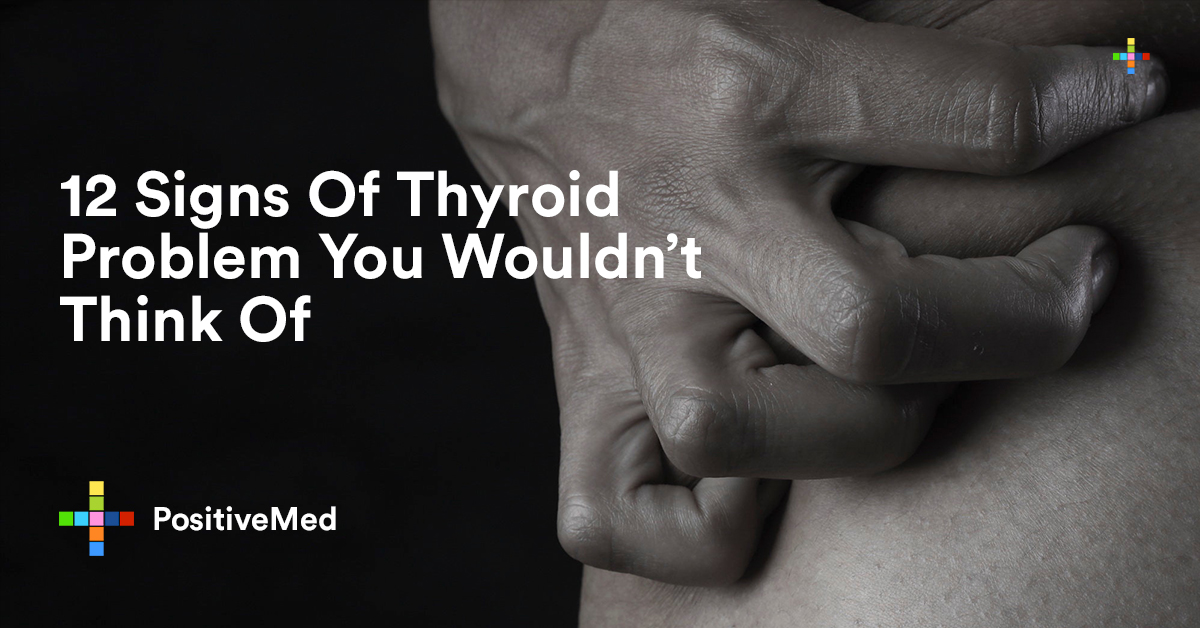Often, when we feel slightly ill we just shake it off and move on as normal. While it can be true that you are okay, sometimes minor symptoms in your body can be indication bigger medical issues in your body. This is the reason you should always pay attention to the messages your body sends you, such as when you experience signs of a

However, if the thyroid becomes unwell, it can become overactive and produce too much of the hormone, or become slow or sluggish and develop too little of the hormone. Your thyroid gland is located in the front of your neck, and it looks like a butterfly. In fact, because of its small size, it might be difficult to believe that it can have much influence on your body. When an overactive thyroid produces too much of the hormone, this condition is known as hyperthyroidism. Conversely, when your thyroid is underactive and produces a
1. Feeling Depressed or Sad

As observed by the Mayo Clinic, an under or over-active thyroid gland can totally alter your mood. Little thyroid in your body can affect the levels of the “happy” serotonin hormone in the brain, making you feel to feel depressed or unusually blue. On the other hand, too much of the thyroid gland can make you feel restless, anxious, or irritable.
2. Constipation

If you are experiencing frequent constipation and you are unable to shake it off, it could be a symptom of a poorly functioning thyroid. Notably, the production of the thyroid hormone could be slowing down digestion in your body. According to Dr. Robin Miller, a specialist in integrative medicine, this is one of the top three signs of hypothyroidism.
3. Sleeping Too Much

- Miller points out that when becoming unable to get out of bed as usual, then that could be a wakeup call that your thyroid is not okay. A lethargic thyroid can make you feel sleepy even during day time.
4. Hair Loss and Dry Skin

ry and itchy skin could be a sign of hypothyroidism. The change in the skin texture could be due to a slower rate of metabolism, which will, in turn, reduce sweating. On the other hand, a lack of thyroid in your body could make your nails and hair feel dry and brittle. Sometimes, little thyroid in your body can make your hair fall out. “Many of my patients are coming to me complaining of their hair loss,” says Dr. Miller. “They normally tell me that their hair stylist told them to see their doctor because they are losing hair. It is like hair salons are more aware of thyroid problems than doctors.”
5. Sudden Weight Gain

According to WebMD, though weight gain can be attributed to a variety of factors, instant weight gain without major alterations in your diet or physical activities may indicate something is not right.
6. No Interest for Closeness

The thyroid is critical to your love-making activeness, and too little of this hormone could make you disinterested in sex. According to Health.com, too little thyroid will result in low libido. Similarly, your love desires could be hampered by the other thyroid symptoms such as weight gain, hair loss, or aches.
7. Muscular Tightening or Pain

If you feel random and strange numbness or tightening in your hands, arms, legs, or feet, your thyroid could not be functioning well. Little thyroid in your body could damage your body nerves, which are responsible for sending signals from your brain to the rests parts of your body. The result is strange or unexplained twinges and tingles.
RELATED ARTICLE: See How You Can Treat Hypothyroidism and Hashimoto’s Disease Naturally
8. Fluttering Heart

When we typically fall in love with someone, our hearts pump in a way you have never felt before. Nonetheless, the fluttering of the heart due to thyroid issues is different. The flutter caused by thyroid issues is more pronounced; it feels like the heart is skipping a beat or two. At times, you can feel the flutter in the pulse points of your wrist or neck. If this is what you are experiencing, then it could be because you are having too many thyroid hormones flowing in your system.
9. Fuzzy Head

Due to advanced in age, your brain may feel fuzzy, but if this situation becomes more intense, it could be a sign that you have a thyroid problem. Too much thyroid hormone in your body can make it difficult for you to concentrate, and while too little of it causes forgetfulness.
10. High Blood Pressure

You may need to check your thyroid if you have high blood pressure, and you are unable to resolve it. An under-active thyroid may lead to high levels of “bad” cholesterol those results in high blood pressure.
11. Increased Appetite or Changes in Tastebuds

According to Health.com, you could be experiencing an under-active thyroid if things taste different. Nonetheless, it could be hyperthyroidism if you are experiencing high levels of appetite.
12. Neck or Throat Discomfort

Since your thyroid is located in the neck, any physical pain in this region should raise an alarm for you. Notably, a lump in your throat, goiter, or even a change in voice could be a symptom of thyroid disorder.






